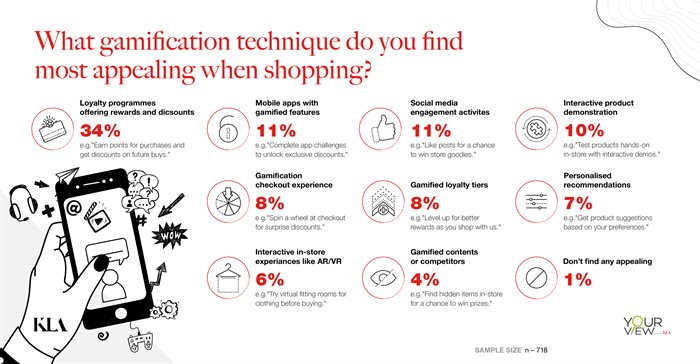Retail Revolution: South Africa Embraces Gamification to Transform Shopping Experiences
In an era reminiscent of the Industrial Revolution, which forever altered the landscape of commerce, South Africa stands at the verge of a seismic shift in the retail sector. This transformation heralds a new epoch where gamification—the strategic incorporation of game-based elements into non-gaming contexts—promises to redefine the shopping experience.
Through mechanisms such as points, badges, and leaderboards, retailers are poised to dramatically increase customer engagement and brand loyalty. This metamorphosis is further aided by the convergence of cutting-edge technologies including Virtual Reality (VR), Augmented Reality (AR), and Artificial Intelligence (AI), which collectively ensure highly personalized and immersive shopping interactions.
The Rising Tide of Gamification
Historically, gamification has found a home across various sectors, leveraging behavioural psychology principles to enhance user experience. By integrating game mechanics into everyday activities, businesses can instill a sense of achievement and progress, encouraging sustained interest and participation.
Classic Examples in Diverse Industries:
- Education: Platforms like Duolingo use game-like features to make language learning both interactive and enjoyable, thereby significantly improving user retention.
- Fitness: The Nike+ app employs a reward system that motivates users through achievements and social sharing.
- Corporate Training: Salesforce’s Trailhead learning platform gamifies skill acquisition and professional development.
The linchpin of gamification lies in its ability to appeal to both intrinsic and extrinsic motivators, transforming mundane interactions into compelling and enjoyable experiences.
The Retail Sector’s Gains
Several key benefits await retailers who adeptly integrate these game design elements into their customer engagement strategies:
-
Enhanced Customer Loyalty: Heightened engagement often translates into improved customer loyalty, fostering a community of brand advocates. This is not a new phenomenon; similar dynamics have been observed throughout history, from Renaissance-era patronage systems to modern-day loyalty programs.
-
Data and Insights: The gamification of retail allows businesses to gather valuable data. For instance, TEMU, the Chinese eCommerce giant making waves in South Africa, uses gamification to analyze user preferences and behaviours. This data is pivotal for tailoring marketing strategies, optimizing inventory, and enhancing customer experience.
- Increased Revenue: Research by Gallup underscores that highly engaged customers are significantly more valuable than average customers. These customers contribute 23% more in terms of spending, profitability, revenue, and relationship growth. The same philosophy that drove loyalty to local merchants in pre-industrial societies now manifests in the digital age—through points and rewards systems that keep customers coming back for more.
Popular Gamification Techniques and Preferences
In a recent YourView poll survey, 718 respondents highlighted their preferred gamification strategies:
- Loyalty Programs: 34.4% favored loyalty programs offering rewards and discounts. YouGov Profiles indicate that 72% of South Africans are more likely to increase their spending with brands that offer such programs.
- Mobile Apps with Gamified Features: 11.0% appreciated mobile apps that provide challenges and unlock exclusive discounts.
- Social Media Engagement: 10.7% chose social media activities like liking or sharing posts for a chance to win store goodies.
- Interactive Product Demonstrations: 10.2% enjoyed in-store interactive demonstrations, highlighting the boredom felt by 60% of South Africans with traditional shopping experiences.
The Future of South African Retail
The gamification trend in South Africa is part of a broader global movement reshaping the retail industry. The future promises a retail landscape where customer experiences are not only more interactive but also deeply personalized. With the integration of sophisticated data analytics, retailers will create highly targeted, rewarding experiences that resonate with individual preferences.
As technology evolves, AR and VR will further revolutionize retail spaces, transforming them into immersive environments that captivate and engage customers on unprecedented levels. It’s a modern echo of the transformative journeys undertaken by ancient merchants on the Silk Road, bringing exotic goods and novel experiences to local markets.
The wave of gamification carries with it the potential to create a dynamic, loyal customer base, ultimately ensuring that retail in South Africa enters a period of sustained growth and innovation.
Quoting source at the end of the article: "Source: YourView Poll and YouGov Profiles"
